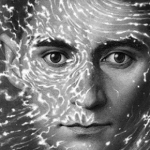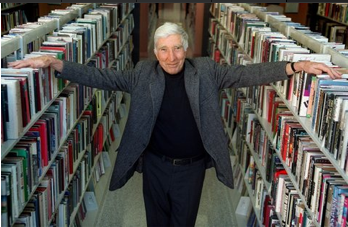More literary musings from Paul Elie of Georgetown University. In his April 30, 2014 Everything That Rises blogpost he springboards again off of “Louis Menand’s characterization of John Updike as a novelist who understood his way of writing as ‘transubstantiating'” and explores a connection between Updike and poet John Donne, speculating on others. Here’s the link:
Category Archives: First Person Singular
John Updike, Transubstantiator?
Georgetown University blogger Paul Elie is at it again, riffing off of a Louis Menand review of the new Begley biography of Updike in a short think piece titled “John Updike, Transubstantiator.”
In an April 25, 2014 entry on Everything That Rises, Elie begins with Menand’s characterization of Updike as “a priest of literature who performed rites of transubstantiation akin to those of Joyce and Proust” and acknowledges that there’s “plenty of testimony” to be found to support such a view. But he also suggests that one shouldn’t make too much of this “congenial” argument—”not to make it the skeleton key that will unlock his large and various body of work.
“Yes, Updike hung photographs of Joyce and Proust on his office wall. But he also revered Nabokov, whose sense of transcendence is strictly, fiercely artistic; he had American realists like Sinclair Lewis in the front of his mind; and unlike the modernist priests of art he cherished his readers, many of them people who saw no reason that American life should need transubstantiating—people who recognized postwar America as a kind of earthly paradise.”
John Updike, Chronicler: a review of a review
 Everything That Rises, out of Georgetown University, published a think piece by Paul Elie that’s a review of (or at least reaction to) writer Orhan Pamuk’s review of Adam Begley’s biography, Updike.
Everything That Rises, out of Georgetown University, published a think piece by Paul Elie that’s a review of (or at least reaction to) writer Orhan Pamuk’s review of Adam Begley’s biography, Updike.
In “John Updike, Chronicler,” Elie notes that Pamuk “all but came out and said the thinkable-unsayable—that Updike was more vital as an essayist than as a novelist” and wonders,
“So why isn’t Updike appreciated as an essayist? Possibly because just as there is no single essential Updike novel, there is no single essential Updike essay (the one about Ted Williams’ last game comes closest). . . . That Updike was a chronicler is true of his essays, too. He chronicled his own life: his coming of age, and his aging. He chronicled the art world through several decades of museum and gallery show reviews. And he chronicled postwar fiction from Nabokov to Pamuk himself in several hundred book reviews. He even chronicled the waxing and waning (mainly the waning) of religious feeling and current trends in Christian theology. The essays, beautifully turned in themselves, were never meant to stand along (though many do). They are set at a very wide angle to their time and place—the angle formed by the pages of an opened New Yorker.”
Ozick: Kafka did not transcend his Jewishness, no matter what Updike claimed
In a review of Kafka: The Decisive Years and Kafka: The Years of Insight, by Reiner Stach (Princeton University Press), writer Cynthia Ozick took exception with Updike’s remarks made in the introduction to Kafka’s Collected Stories:
 “In an otherwise seamless introduction to Kafka’s Collected Stories, John Updike takes up the theme of transcendence with particular bluntness: ‘Kafka, however unmistakable the ethnic source of his ‘liveliness’ and alienation, avoided Jewish parochialism, and his allegories of pained awareness take upon themselves the entire European—that is to say, predominantly Christian—malaise.’ As evidence, he notes that the Samsas in ‘The Metamorphosis’ make the sign of the cross. Nothing could be more wrong-headed than this parched Protestant misapprehension of Mitteleuropa’s tormented Jewish psyche. . . . The idea of the parochial compels its opposite: what is not parochial must be universal. And if the parochial is deemed a low distraction from the preponderant social force—’that is to say, predominantly Christian’—then what is at work is no more than supercilious triumphalism. To belittle as parochial the cultural surround (‘the ethnic source’) that bred Kafka is to diminish and disfigure the man—to do to him what so many of Kafka’s stories do to their hapless protagonists.”
“In an otherwise seamless introduction to Kafka’s Collected Stories, John Updike takes up the theme of transcendence with particular bluntness: ‘Kafka, however unmistakable the ethnic source of his ‘liveliness’ and alienation, avoided Jewish parochialism, and his allegories of pained awareness take upon themselves the entire European—that is to say, predominantly Christian—malaise.’ As evidence, he notes that the Samsas in ‘The Metamorphosis’ make the sign of the cross. Nothing could be more wrong-headed than this parched Protestant misapprehension of Mitteleuropa’s tormented Jewish psyche. . . . The idea of the parochial compels its opposite: what is not parochial must be universal. And if the parochial is deemed a low distraction from the preponderant social force—’that is to say, predominantly Christian’—then what is at work is no more than supercilious triumphalism. To belittle as parochial the cultural surround (‘the ethnic source’) that bred Kafka is to diminish and disfigure the man—to do to him what so many of Kafka’s stories do to their hapless protagonists.”
Here’s the full review, which appeared in the April 11, 2014 Books section of the New Republic: “How Kafka Actually Lived; He did not transcend his Jewishness, no matter what Updike claimed.”
Flavorwire offers The Skeptic’s Guide to John Updike
Today Flavorwire posted an article from Jason Diamond that was obviously inspired by the release of Adam Begley’s biography, and yet it’s not a review. In “The Skeptic’s Guide to John Updike,” Diamond mistakenly credits the Boston area for Updike’s “rearing,” but offers that people who already like Updike’s work will like Begley’s “excellent new biography,” which “will give you more insight into a writer you might still be conflicted about reading.” He also advises resistant readers to try The Complete Henry Bech, Hub Fan Bids Kid Adieu, and the LOL volume of the complete short stories.
NPR spotlights Begley’s UPDIKE
NPR spotlights Adam Begley’s biography Updike today, featuring an audio interview and a published version that includes “Interview Highlights”:
“Biographer Explains How John Updike ‘Captured America'”
Asked what kind of dinner guest Updike was, Begley responds, “You would be aware that he was noticing you with terrific intensity, and you might find even that he’d put you in a story next time.”
Higgins on Begley’s case for rereading Updike
Jim Higgins, who may be familiar to readers as the Milwaukee Journal Sentinel journalist who has been reading an Updike short story weekly and posting his considerations, has been thinking about Updike again—this time in the context of the forthcoming Adam Begley biography, Updike, which will finally be available to the general public next week.
“Adam Begley’s bio makes strong case for rereading ‘Updike'”
New York Observer writer considers the case for Updike as a major artist
Even before it falls into the hands of average readers on April 8, Adam Begley’s biography, Updike, is doing what scholars and society members expected: reawakening the debate over Updike’s status as an American writer.
There has always been a small segment who think he “writes like an angel but has nothing to say,” and reports of his demotion in the canon have been greatly exaggerated, given his continued presence in major anthologies. Michael H. Miller of the New York Observer weighs in, but only concludes “Updike, like George Caldwell in The Centaur, a character modeled after his own father, did the best he could with what was given to him—a massive flawed talent. Here’s the whole article:
Begley: How JU Turned Everything in His Life to His Advantage in Fiction
Vulture.com today posted a story by Updike biographer Adam Begley—a segment, really, from Updike. For those who can’t wait to get a copy, it’s pretty much an official teaser:
“How John Updike Turned Everything in His Life to His Advantage in Fiction”
Updike will be published on April 8, and is currently available in hardcover from Amazon.com for $21.77 or on Kindle for $14.44.
Blogger contemplates a passage from Self-Consciousness
The Friday, March 21 2014 post for The Bully Pulpit blog was titled “John Updike on Falling Airplanes and His Faith in a Fallen World,” in which the writer thoughtfully responds to a long “magisterial” passage from Updike’s Self-Consciousness: Memoirs.
“Updike is a writer who pulls the sublime from effortless, conversational sentences, affirming his reflection that ‘to give the mundane its beautiful due’ was the purpose of his writing style. And man, do you feel the power of that impulse in these memoirs,” JR Benjamin writes. He considers as well a poem by Philip Larkin and concludes, “Not to put too fine a point on the issue, but I think the contemporary American Church, with its Hollywood aesthetic and prosperity gospel, has lost much of that crucial, validating seriousness” both that informed both Larkin’s and Updike’s sense of religion and church-going.

